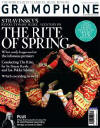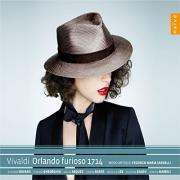Texte paru dans: / Appeared in:
|
|
|
Reviewer: David
Vickers Vivaldi took over management of opera at Venice’s Teatro S Angelo and put on a production of Giovanni Alberto Ristori’s Orlando furioso. He also initiated a revival on December 1, 1714, and for many years it was assumed that only minimal alterations were made to Ristori’s music; but recently musicologists have scrutinised the sole surviving manuscript (now in Turin) more closely. Extensive revisions indicate that Vivaldi systematically replaced Ristori’s arias, even during the 1713 run of performances, and by the time of the 1714 revival the music seems to have been almost entirely rewritten by Vivaldi. This recording presents not so much a rediscovery (as it might be inaccurately hyped) but a reconsideration of authorship. Federico Maria Sardelli’s meticulously detailed booklet-note explains that the Turin manuscript lacks Act 3 and also has a number of arias missing or without important parts: ‘Not wanting to burden the world with new pasticcios, I rejected out of hand the idea of reconstructing the missing third act. However, I did set out to tackle the problematic status of the incomplete arias.’ Hence this recording presents Sardelli’s editorial completion, assisted by Frédéric Delaméa, of the existing material for only Acts 1 and 2. Consequently, Modo Antiquo’s spirited performance cannot be experienced as a coherent dramatic whole, but it is to the credit of the performers that they strive for dramatic conviction. The devious Alcina is sung expertly by Romina Basso and Teodora Gheorghiu’s Angelica suitably protests far too much in her deception of Orlando (‘Tu sei degli occhi miei’). Three seemingly intact scenes are highlights: Astolfo, restored to human form when freed from Alcina’s curse, warns Ruggiero to flee from the sorceress in ‘Ah, fuggi rapido’ (sung vibrantly by Roberta Mameli); after Ruggiero is cured by the steadfast Bradamante, his remorse is tenderly expressed by David DQ Lee in the intimate continuo aria ‘Piangerò’ (featuring lyrical cello obbligato); Act 2 ends effectively with Orlando venting his heartbreak and rage upon discovering Angelica’s marriage to Medoro (Riccardo Novaro’s resonant bass ideally invites pathos). Sardelli’s conscientious experiment opens up an intriguing new perspective into Vivaldi’s encounter with a story to which he would return in 1727 for his famous masterpiece. |
|
|
|
|
|
Cliquez l'un ou l'autre
bouton pour découvrir bien d'autres critiques de CD |
|




